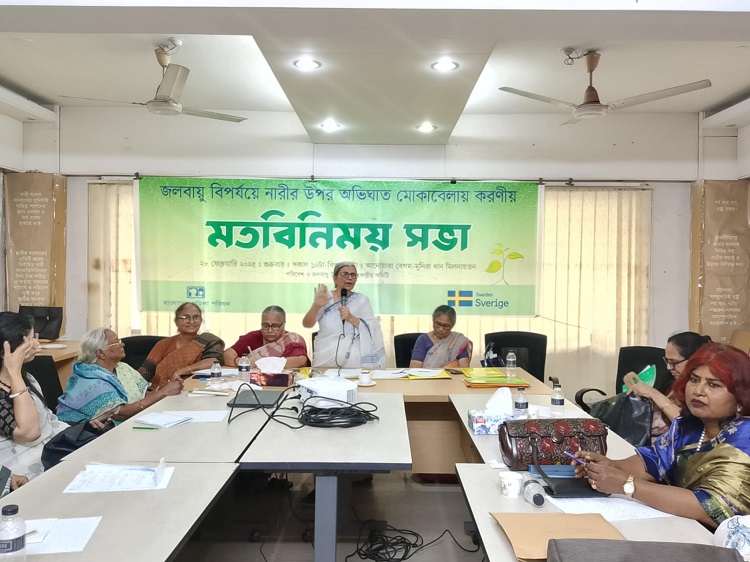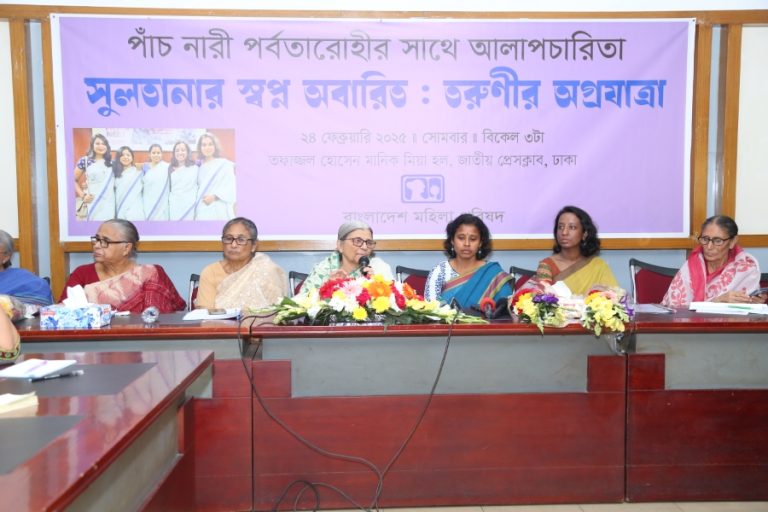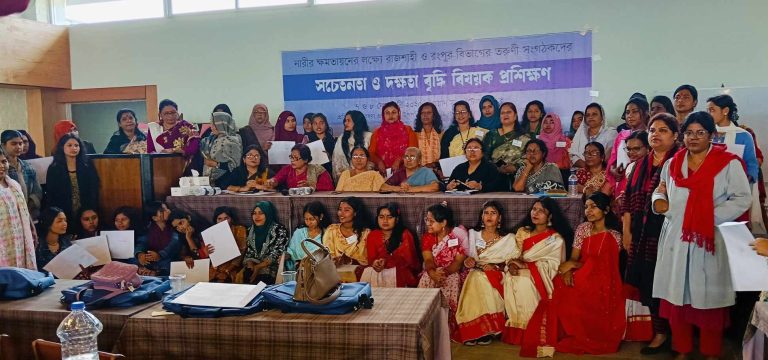On 9th March 2022 (Wednesday), at 10:30 am, a webinar was held on the occasion of International Women’s Day by the initiative of the Social Resistance Committee, a platform of 66 women, human rights and development organizations – focusing the theme “Equality between men and women, key to a sustainable future”, with the slogan “Stop discrimination and violence against women, ensure equal rights and equal share in property”.
The president of Bangladesh Mahila Parishad (BMP) Dr. Fauzia Moslem was present as moderator in the webinar. Honorable Member of Parliament Shireen Akhter MP and Honorable Member of Parliament Shabnam Jahan MP were present as special guests. The main speech was presented by the president of Women for Women, Nilufar Banu. Banashree Mitra from Manusher Jonno Foundation (MJF) discussed the issues to be done to prevent violence against women and girls; Shahnaz Sumi, deputy director of Bangladesh Nari Pragati Sangha, discussed the obstacles to women’s economic empowerment and what to do; Discriminatory family laws and issues discussed by the Director of Ain o Shalish Kendra(ASK) Adv. Nina Goswami and Farah Kabir, Country Director of Action Aid Bangladesh, discussed the issues to be done to change social attitudes and values towards women.
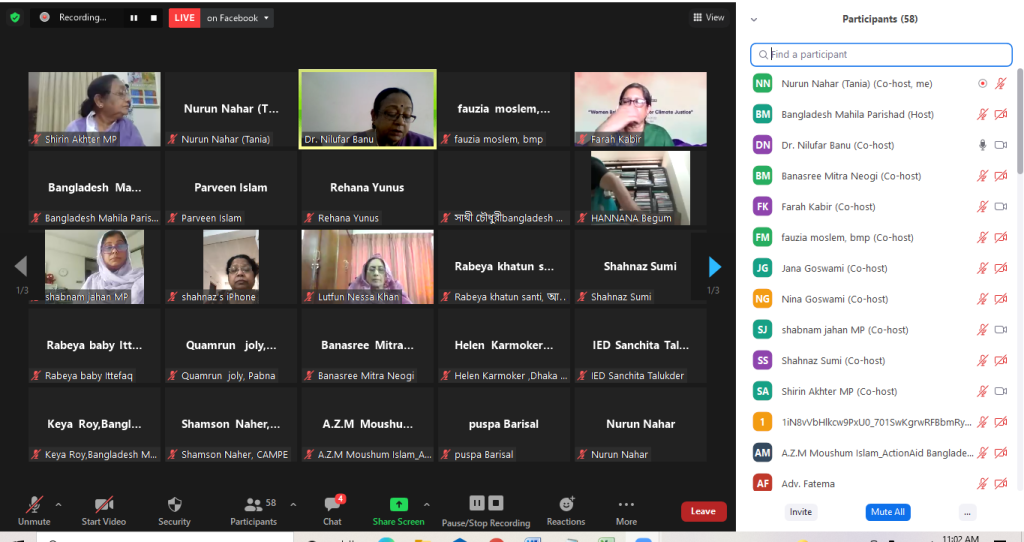
The webinar was attended by 64 people including representatives of member organizations of the Social Prevention Committee, members of the central committee of the organization, members of the National Assembly, editors, journalists and officials of print and electronic media.
Nilufar Banu ,President of Women for Women, during the presentation of the main speech, presented the context of International Women’s Day on March 8th, She said-
“In 50 years of independence, Bangladesh has made significant progress in various indicators of socio-economic and political sectors. The contribution of women in this progress is the most, especially in agriculture, education, health, labor sector, though the contribution of women is significant, but they have to advance further to reach the expected equality between men and women.”
Shahnaz Sumi, deputy director of Bangladesh Nari Pragati Sangha, said during the discussion that-
who are economically weak are oppressed in many ways, the number of women oppressed is high, many laws are still discriminatory, women have less access to the structural aspects of policy and law implementation. Women’s domestic labor accounts for 47% of GDP, which is unrecognized. The presence of women is very low even at the policy making level. To change the condition she said that discriminatory laws need to be changed, the conditions provided for receiving government benefits should be made easier for women, information flow should be disseminated in the media, service providers should be trained to adopt gender sensitive attitudes and research and policy advocacy are necessary for monitoring the allocations for women in the national budget.
Banashree Mitra, Deputy Director of the Manusher Jonno Foundation (MJF), said while discussing-
what can be done to prevent violence against women that prevention, protection, provision, participation and reporting of violence against women in all areas including family and workplace should be done separately. To ensure a safe environment to prevent violence against women, the government should review the plan, focus on obtaining data, monitor the extent of work done, and formulate and implement further recommendations.
Director of Ain o Shalish Kendro (ASK) Adv. Nina Goswami said –
“Since the 80s, Bangladesh Mahila Parishad (BMP) has raised strong demands for the reform and formulation of discriminatory family law, but the government’s action has not been seen so far. As a result of various movements in Bangladesh, the marriage registration law has been enacted nationally, but there is no way to get any official information about it. Somewhere this law is optional and somewhere else it is made mandatory. Divorce also has discrimination. There is discrimination in polygamy according to different religions. Inheritance laws and adoption laws are fraught with discrimination. She demanded the reform of discriminatory family laws to overcome the barriers of women.”
Farah Kabir, Country Director of Action Aid Bangladesh, said,
“In order to change the social perspective, we need to change the story of the conventional view of discrimination against women in the family and in the society and highlight the direction of establishing the field of equality. We are taking a stand against violence against women but there is no provision to prevent it, if it happens. Change should start from your family. We still have work to do to make women self-reliant.”
After the discussion, Hasina Akhter from Karmojibi Nari , Sanchita Talukder from IED, Samapika Halder from Edab, Shamsun Nahar from Mass Literacy Campaign, Lutfun Nesa Khan from Nari Oikya Parishad, Adv. Nilanjana fom Pallima Mohila Parishad took part in a free discussion.
They said, to establish women’s rights and equality, women’s development policy should be implemented, education should be made compulsory for women, women’s family work pressure should be reduced, we need to create a perspective of thinking of women as human beings. They also added, self-employment opportunities should be created for women, To fulfill the quota system for women in the workplace, women should be given the opportunity to become ready for work, All women-friendly organizations should share tasks and areas to prevent discrimination and violence against women. They said that, Rape evidence law should be changed, strong movement should be made to ensure witness protection, we should bring equality to women domestic workers, fixed wages should be fixed for them.
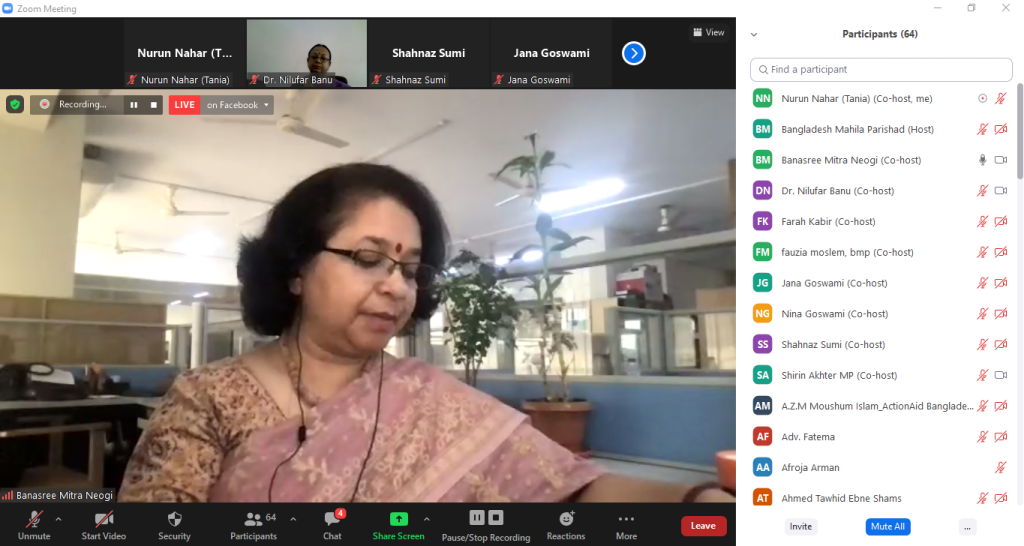
In the speech of the special guest, Honorable Member of Parliament Shireen Akhter MP discussed about what can be done to build a sustainable society by ensuring the equality of men and women. She said that real development does not take place as social infrastructure does not improve along with economic infrastructure. Child marriage is still happening , the punishment of the Qazi is not confirmed. The initiative to form Kishori Club to make teenagers aware of preventing child marriage is bearing fruit, this activity should be continued.
A change in social attitudes is essential for the overall implementation of the program, power dynamics are important here. In order to continue the various developments achieved in the 50 years of independence, all must be united to deal with the forces (fundamentalist, communal and militant forces) that hinder the development of women in a strong and tough manner. During the discussion about the immediate actions for the social prevention committee, she said that awareness should be created, publicity should be done and everyone should continue the movement in a united manner.
Honorable Member of Parliament Shabnam Jahan MP said,
“We are all women. Women can do many things.” At this time, she promised “No more oppression, in all areas there will be rights of men as well as women.”
The demands have been met to a large extent, and the government is working to implement the demands that have not been met. Violence against women is ongoing.
Moderator of the webinar Dr. Fauzia Moslem said,
“Women are a very awakened force today. We must use this awakening to shape the future. The young generation has to do the work of bias breaking to change social attitudes. Bias breaking requires self-awareness first. Some changes are happening, but to ensure its effectiveness and sustainability, legal frameworks must be created, institutional foundations must be strengthened, communal forces must be resisted.
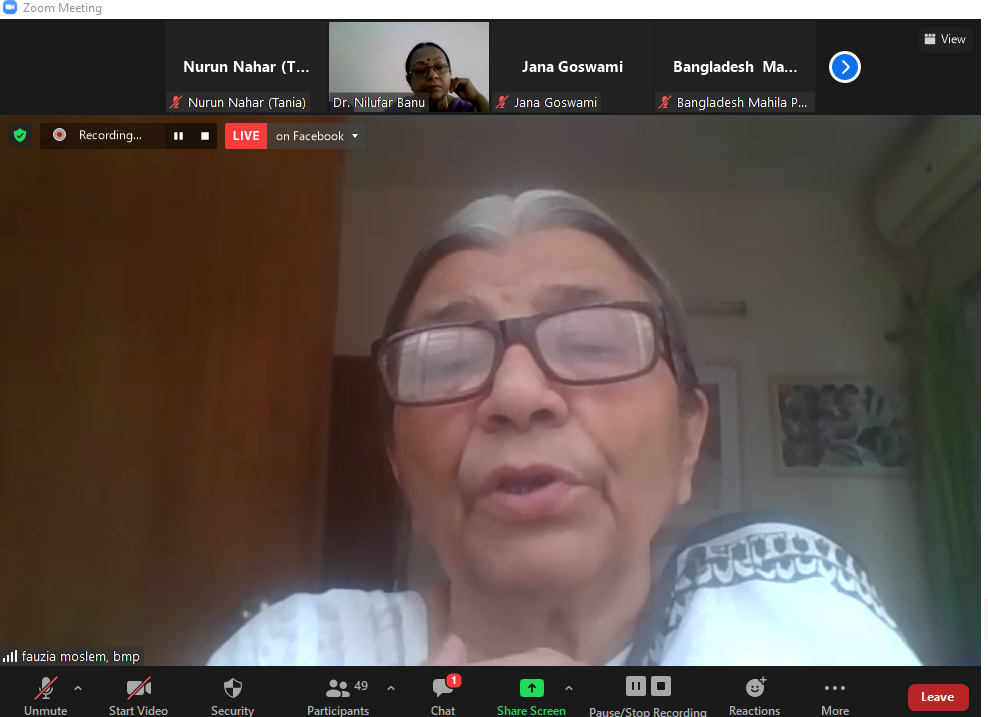
Women politicians must have the will to add women’s demands to political parties, and build a strong women’s movement. Eliminating multi-faceted violence in women’s life is a big challenge for the women’s movement, the women’s movement should be tackled and moved forward”.
Besides, she urged the women parliamentarians to support this movement in every way. She ended her speech by calling for the building of a sustainable society for the next generation by removing the barriers to women’s equality.
The report of the said webinar was published in 2 national daily newspapers (Samakal, Ittefaq) and 6 online newspapers (Bhorer Kagaz, BSS, Jago News, Dhaka Post, Women I Twenty Four).

